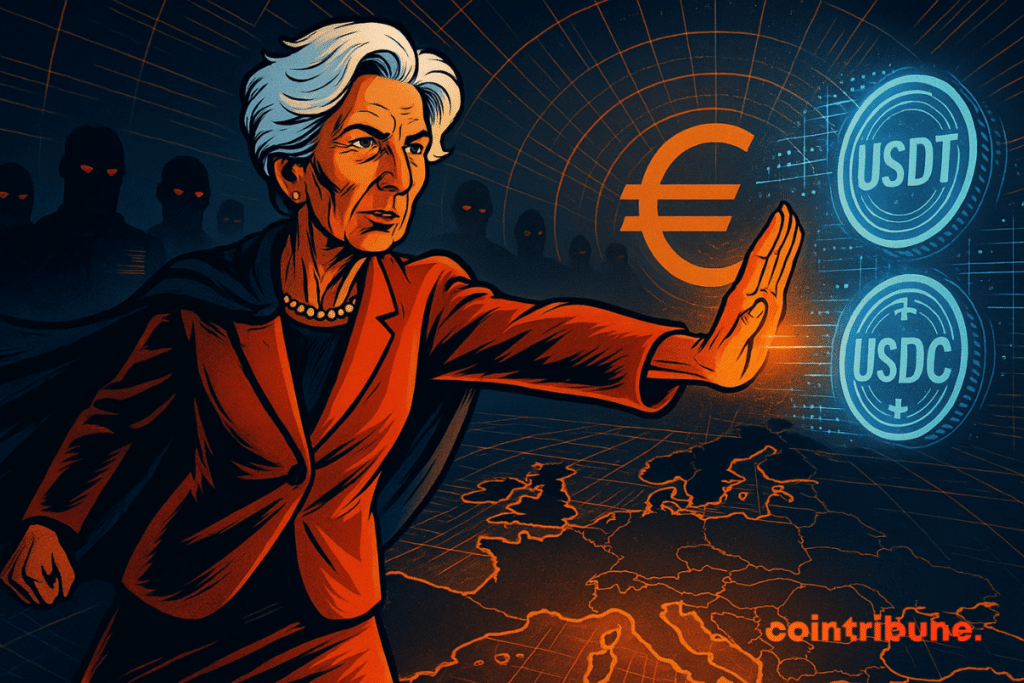Christine Lagarde Cracks Down on Foreign Stablecoins as Europe Seeks Control
The President of the European Central Bank steps up against dollar-backed stablecoins. During a conference in Frankfurt, Christine Lagarde demanded “firm” guarantees for any foreign issuer wishing to operate in the EU. A strong signal of European fears regarding the growing influence of the greenback in cross-border digital payments.

In brief
- Christine Lagarde imposes strict equivalence conditions on foreign stablecoins wishing to operate in the EU.
- The ECB fears that a banking rush on stablecoins will favor the best-protected jurisdictions like Europe.
- Stablecoins now represent nearly 290 billion dollars in global capitalization, dominated by the American USDT.
- This stance is part of a European strategy to counter the hegemony of the dollar via stablecoins.
Christine Lagarde demands strict guarantees for foreign stablecoins
On Wednesday, during the European Systemic Risk Board conference in Frankfurt, Christine Lagarde raised her voice.
The ECB President demands that foreign stablecoins comply with European standards before any activity in the Union. A stance that marks a turning point in the European approach to digital assets.
In a speech in Frankfurt, Christine Lagarde hammered that these assets must respect the regulatory framework of the bloc to prevent arbitrage and protect financial stability.
Behind this red line, an obvious target: American giants Tether (USDT) and Circle (USDC), whose combined capitalization exceeds 220 billion dollars. The issue goes beyond technicalities: it is a monetary infrastructure battle in the digital age.
The ECB chief also warned against poor liquidity management across jurisdictions. In case of a trust crisis, holders will seek redemption in the best-protected zones.
However, in Europe, MiCA prohibits redemption fees: an influx of requests could quickly dry up local reserves if the issuer operates elsewhere while capturing repayments.
This offensive is part of a broader strategy. For months, European authorities have multiplied warnings about stablecoins. The Bank of France had also warned in June of a risk of “privatization of money.” A deliberate vocabulary, revealing the growing concern of central bankers about the rise of private assets likely to circumvent their control.
Europe facing the challenge of monetary sovereignty
The numbers speak for themselves: nearly 290 billion dollars worth of stablecoins are circulating worldwide today. USDT accounts for about 60% of the market, reinforcing the dollar’s hegemony in the digital economy. A situation Christine Lagarde intends to oppose.
She compares these challenges to those faced by international banking groups, subject to strict liquidity ratios to avoid imbalances between subsidiaries.
Facing this rise of foreign stablecoins, Europe is accelerating its own projects. The digital euro, technically ready according to the authorities, could be launched before the end of 2025. A defensive project aimed at preserving European monetary autonomy in an increasingly digitalized world.
But the task looks tough. While Europe hesitates, the United States advances. The American GENIUS Act has already set a favorable legal framework for domestic stablecoins.
On his side, Tether’s CEO Paolo Ardoino has categorically refused to subject USDT to the MiCA regulation, deeming the European requirements “dangerous” for the banking system.
Christine Lagarde’s statements mark a new stage in the regulatory battle over stablecoins. Far from being a simple technical debate, this offensive reveals geopolitical tensions around the future of digital money. Europe seems determined not to leave the field open to the American crypto giants.
Maximize your Cointribune experience with our "Read to Earn" program! For every article you read, earn points and access exclusive rewards. Sign up now and start earning benefits.
Passionné par le Bitcoin, j'aime explorer les méandres de la blockchain et des cryptos et je partage mes découvertes avec la communauté. Mon rêve est de vivre dans un monde où la vie privée et la liberté financière sont garanties pour tous, et je crois fermement que Bitcoin est l'outil qui peut rendre cela possible.
The views, thoughts, and opinions expressed in this article belong solely to the author, and should not be taken as investment advice. Do your own research before taking any investment decisions.